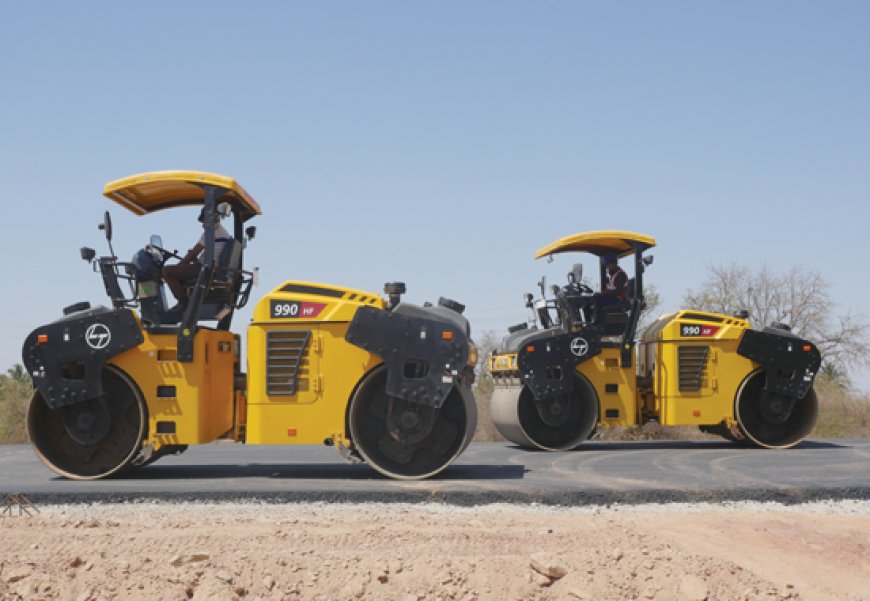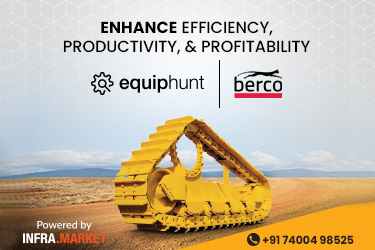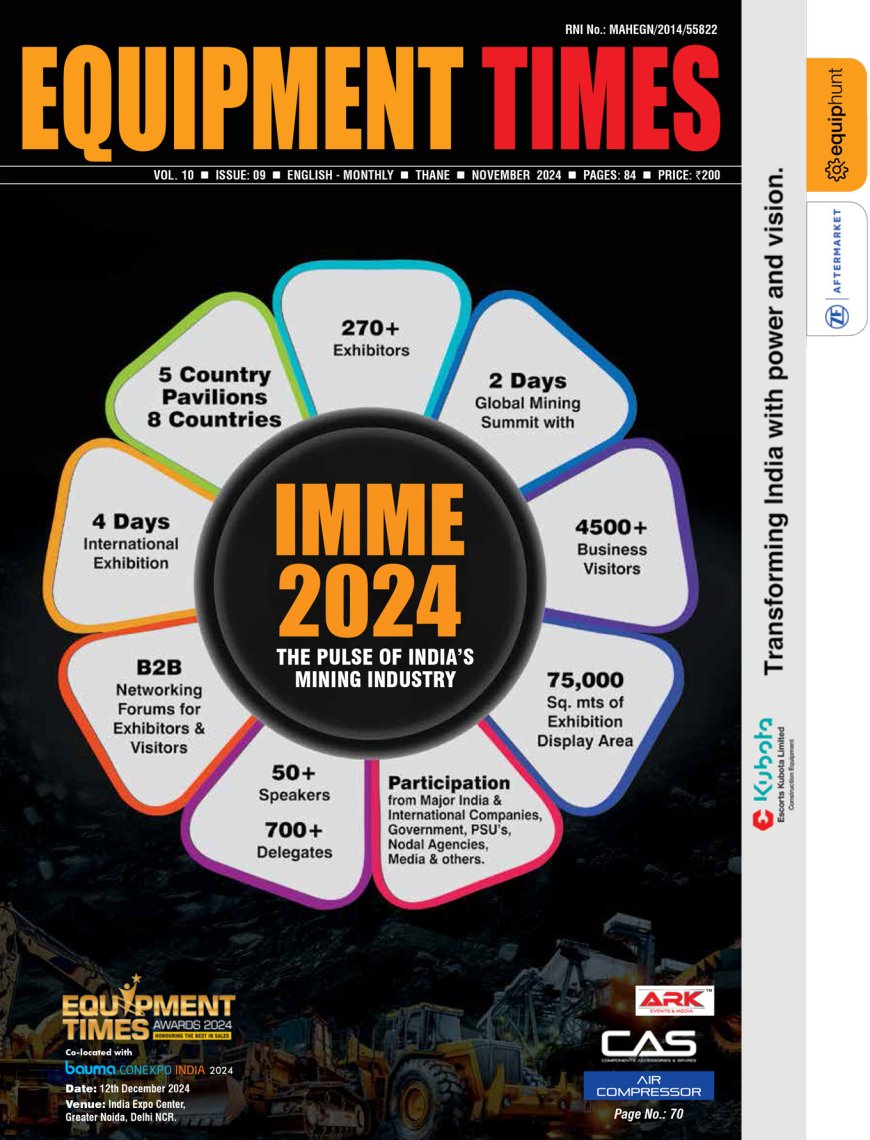Automation and Digitization in Road Construction
Equipment manufacturers have brought in advanced and intelligent road construction technologies to up the pace of better quality road construction. It is hightime that project executing agencies adopted such technologies. EQUIPMENT TIMES tracks some of the intelligent technologies in road

Equipment manufacturers have brought in advanced and intelligent road construction technologies to up the pace of better quality road construction. It is hightime that project executing agencies adopted such technologies. EQUIPMENT TIMES tracks some of the intelligent technologies in road construction.
Construction being one of fast growing industries around the world, usage of automation and machine control technologies is growing rapidly. Developed countries are already reaping benefits such as higher productivity, controlled costs, perfect predictability, efficiency, quality, safety etc. from a range of new control technologies and advanced automation. In addition, this helps them keep projects on track and complete them in time with higher quality. Conversely, in India construction is one of the least automated industries. However, now things are changing as mobile equipment manufacturers are offering advanced functionalities such as GPS, data collection, condition monitoring, secure remote maintenance, connectivity options and much more. With this, the barriers for adopting new technologies are falling; however, it would take some time to reach automation levels deployed in the western world.
Saurabh Kulkarni – Mobile Automation Expert – B&R India says, “The construction industry being a cost sensitive industry, the investment in high tech equipment or IT was always in question. However, since last couple of years, big players have started leveraging technologies such as Industrial IoT for real time data monitoring, data analytics, predictive maintenance for enhancing availability, efficiency and boosting margins. In India, Government has laid a foundation with its ‘Digital India’ mission and various other schemes. The Ministry of Road Transport and Highways, is encouraging the implementation of a ‘Value Engineering Program’ to promote the use of new technologies. With these developments, construction equipment market is likely to witness a rise in technology demand and see an influx of increased automation and digitization concepts coupled with enhanced safety. While many large OEMs having already embraced some technologies, we expect use of digital technologies to become more widespread among construction equipment manufacturers of all sizes in coming years.”
Industry Perceptions
“There has been a continuous upgradation in technologies what our customers have been using for the highway construction in India. The pace of adapting to new technology has picked up considerably in the last 3-4 years. From the Wirtgen Group stand point, we have been able to introduce and popularize technologies like cold milling, recycling, hot recycling and Niveltronic Plus and many more,” states Ramesh Palagiri, Managing Director & CEO, Wirtgen India.
Says Krishnan, Vice President and Head of Volvo CE India, “Today, buyers in India are tracking costs carefully and are willing to invest in higher initial costs for reliable equipment that is more productive, fuel efficient and can deliver value over the machine’s lifetime. Current purchase decisions evaluate ‘value’ beyond the initial purchase price and look at additional benefits the machine brings over its lifetime, whether that’s maintenance services, response speed, parts availability, or financial and resell solutions. All these factors are influencing how customers evaluate value versus cost of procurement.”
“Like most other sectors, in construction equipment sector, we have our own challenges in terms of deploying advanced technologies. Resistance to change, lack of information on new technology, higher acquisition cost are some of them. Any technology takes longer time to get acknowledged and adapted. Generally it takes time for the end user to understand and get well versed with the technology and then accept it. But looking at the growing demands and requirements, people are understating the value of technology and are also accepting it,” opines Ajay Aneja, Brand Leader, CASE India.
However, it is heartening to note that in recent years, some state governments have initiated proposals for advanced and sophisticated technologies, for example ‘Intelligent Compaction Measurement Systems’ to support quality monitoring programs in road construction. However, the big challenge is still in improving acceptance levels among road contractors, primarily due to the additional cost involved in these systems.
“We have developed a series of initiatives to build awareness of Intelligent Compaction, partnering with various road authorities through our centre for Road Technology – RASTA (Resource Centre for Asphalt and Soil Training Academy). However, our understanding is that while many authorities are currently assessing options to make implementation a key requirement; in reality it is likely to be some time into the future before we see real change.” says Krishnan.
Data-driven Technologies
Data-driven technologies and Big data analytics have brought a profound shift in the construction space, especially building of roads and highways. For example, highly demanding situation in the construction industry has increased the need for precise, transparent and verifiable results of compaction. The terms for bidding and tendering in road construction are getting stricter as are the standards for quality results. The result of the innovative spirit of the OEMs and automation vendors is ‘Intelligent Compaction” technologies.
“Compactors with improved reliability and fuel efficiency play an important role in buying behaviour. In addition to performance and productivity, customers are also increasingly aware about operator safety, operating and maintenance cost. New technologies like intelligent compaction, HCQ system for Hamm compactors, 3 point articulation, edge cutting option, some of the add on features; the new trends in our range,” states Ramesh.
Recently, JCB India has upgraded its well known model, the JCB 116 soil compactor. According to Jasmeet Singh, Head – Corporate Communications and External Relations, JCB India, it is a first in the industry to have Intelli-Compaction integrated with Livelink. “Intelli-compaction provides relative compaction value, which helps in achieving consistent and uniform compaction throughout the patch. The digital display shows high/ low frequency and amplitude values for compaction control.”
“Compaction is one of the most critical processes associated with constructing highways; and checking it manually does not provide the accurate results as well as delays the process. Adoption of data-driven technologies such as intelligent compaction will fasten the process of making of the roads and highways which are much more durable and have a longer life span which requires less maintenance. With this the contractors can also monitor the developments sitting thousands of kilometers away from the site of construction. This technology is very well versed for the government projects,” Aneja.
“The role of telematics is increasing in all spheres of the road construction activity. This helps the operator know which surfaces have already achieved the required density thereby ensuring that the compaction is complete. This increases the speed to the work and reduces the time required for supervising and inspecting the surfaces,” opines Jaikumar Kamath, Joint General Manager and Head-Road Machinery Business, L&T.
As per the Ministry of Road Transport and Highways (MoRTH) specification, a road project execution agency has to achieve a maximum dry density (MDD) of 95-97 per cent; for embankment it is 95 per cent and earthwork, it is 97 per cent. As a user, one will be looking at how much passes are required to achieve the desired density. Along with that, major parameters he will be looking at the soil type and design requirements. While selecting a particular brand of soil compactor, major parameters looked for are static liner load, nominal amplitude and vibration frequency as these parameters effects the compaction activity the most. Some of the other attributes one looks into is the operations and maintenance cost, and fuel efficiency. It is here compactors and rollers with IC technology scores.
IC technology will help improve the quality of the roads and improve the efficiency of the operator. With IC systems, the quality is not dependent on the operator skills but is system driven and consistently achievable. It is required to create the awareness to equipment owners on the advantages of the system and how the system will help to improve productivity and reduce the operating cost.
Intelligent technologies based on data analytics and telematics has changed the offerings from OEMs in most of the construction equipment segment. With regard to crushers and screens segment Raj Shrivastav, Executive-in-Charge, Crushing & Screening Solutions and HMAP, TIL Limited had this to say. “Crushers and screens are capital intensive assets operating mostly in remote and harsh locations. Use of telematics in India is growing in the construction equipment sector to ensure not only tracking, set-up and safety of the machines, but also better monitoring and data analysis, resulting in predictive maintenance and optimal planning of resources. All these ultimately lead to better performance and life of the assets, and hence, peace of mind for the owners and operators. The Telsmith TRAC10®, for example, is a stand-alone control system that monitors crusher operations, provides automated calibration and setting controls, and protects the crusher from overload; all to yield greater crushing performance and efficiency. Optimum crusher settings are maintained via remote monitoring adjustment using the TRAC10®. Operators can initiate an automated calibration process via the touch screen monitor, that automatically ‘zero’s-out’ and resets to the proper setting.”
According to Ramesh of Wirtgen the operation of crushing plants is becoming more and more complex due to the increasing requirements placed on modern crushing plants. At the same time, the technology must be reliable and as simple as possible to operate – and without lengthy instruction and familiarisation periods. Ramesh says, “Here comes the strong point of the new operating concept called SPECTIVE from Kleemann. With impressive range of functions and intuitive operation, it provides clear instructions and its self-explanatory symbols actively support the user in finding the right setting for each application.”
He further adds, “The interface between man and machine allows us to use our crushing plants properly and fully utilise their capacities in a very easy way. SPECTIVE is characterised by the fact that only functions which are actually required are shown. With clear symbols all plant functions are recognisable at a glance and can be set and adjusted in a few steps. Simple menu guidance guarantees that only the information which is currently required is displayed on each page. Clear instructions actively support the user in the application, thus reducing operating errors significantly. In addition, machine operation data can be retrieved via the touch panel and the diesel and lube oil fill levels, for example, can be viewed in the plant cockpit. The information is also documented.”
The CE industry has witnessed continuous improvements to the so called beast – Motor Grader, making the machine stronger and better balanced. While all machines continue to evolve in terms of controls, ergonomics, fuel efficiency, etc, the most important having an impact on the bottom line, it seems, are data-related, that is through machine control and telematics system technologies. How strong is the machine-control penetration in the grader market and how receptive are the end-user segments in accepting grade control systems?
Says Manish Arora, Business Head, Mahindra Construction Equipment “Internet of things is becoming increasingly popular with construction equipment too. This kind of technology integrated with the machine lets the operator get a better picture of the job site. Mahindra RoadMaster G75 comes with DigiSense technology whose software has been developed to bring down machine abuse and fuel theft which are a major issue across the country. GPRS based technology with software customizations in line with industry requirement of geo fencing among others help keep a log of the machine’s data for future reference. It also helps keep track of the machine’s numbers in terms of efficiency and fuel consumption. The customized software also helps run trouble shooting and diagnostic measures to ensure added safety and efficiency of the machines.”
According to VG Sakthikumar, Managing Director, Schwing Stetter Sales and Services the use of grade control system is still in nascent stage. “The machine and grade control system is still in the initial penetration stage. It is a feature that comes with cost and only a very few corporate customers opt for this feature. This will have a greater significance only when the projects demand very stringent output.” He adds, “In our machines the telematics offered are an optional feature and in fact it is in the developing stage only. It calls for a dedicated server setup in India. The benefits of this are with the fleet management, machine utilization and health monitoring of the machines. The rental and corporate companies will be more benefited and they are very much aware of these features. In telematics, the various parameters of the machines such as the oil temperature and pressure, fuel levels, machine running hours and engine ignition are monitored and sent to the central cloud system and from there the client will be downloading the data.”
Surat Mehta, Head, SDLG India is on the same page. “Machine-control technologies are still nascent and their market penetration low. While we can offer them on demand through vendor, one deterrent is cost as these technologies are expensive. We don’t currently offer these technologies in our machines as we want to keep them cost-effective for customers.”
So like in the compaction equipment segment, here also the initial cost is a major deterrent. According to Ajay motor grader is a sophisticated machine which needs expert operators. But, with grade control system, the machines can be controlled easily by operators. However, he adds, “The challenge which comes with grade control system is the cost. The system is quite costly hence; it is not that popular in present time. But based on current trends and market requirements this system will be of great help and will be used more.”
Another major area where automation and machine control technologies have had a positive impact is in flexible road paving applications. The paving quality of any road is defined by the ability of the paver to satisfy three requirements in line with the highway design: mat thickness, level of the mat, and the grade required. Regular pavers without sensors simply follow the undulations of the road base and are therefore unable to give a smooth finish to a paved surface. But sensor pavers have intelligent operating technology that helps the machine deliver on these three requirements.
Krishnan of Volvo explains. An option to improve paving performance and productivity is Pave Assist. Pave Assist is designed to improve functionality, providing operators with real-time insight to the quality and productivity of the paving operation – both during and after the job is complete. Powered by Volvo Co-Pilot, the company’s proprietary display and processing device, Pave Assist helps operators to manage all paving operations with greater ease and independence. The system is easy-to-use and diminishes interruptions in the workflow, liberating operators to concentrate on surroundings for improved site safety, quality control and workflow. Operators can simply tap, zoom and select from a powerful set of tools and information hosted on Volvo Co-Pilot. All data is managed, processed and displayed on Volvo Co-Pilot, enabling operators to monitor the progress and output of their work in real time. The data is stored on the Cloud and can be accessed remotely, allowing complete paving management.
Tools offered by Pave Assist include Material Manager, Thermal Profiling and Weather View and – as a complementary option – Volvo Smart View.
Material Manager offers live, on-board information and automated reports, eliminating the need for hours of measurements and manual documentation. The state-of-the-art module calculates the distance and tonnage paved, paving area and CO2 emissions. By recording the volume of delivered asphalt and the amount of road paved, Material Manager allows operators to identify the Volvo paver’s throughput efficiency, useful in building a record for future projects.
Joining Material Manager is Thermal Profiling, a tool that is designed to ensure high quality mat surface is delivered. The module monitors the paved asphalt and detects any temperature variations that could affect compact-ability and durability of the mat. As a result, operators can ensure laid material is consistent throughout or swiftly identify and correct process issues.
To further improve efficiency, Pave Assist features Weather View. The function keeps an eye on current and upcoming weather conditions, connecting paving crew to high quality forecasting services. With the most up-to-date information, operators can better plan and adapt more efficiently – rain or shine.
For optimum control and safety, Volvo Smart View provides a complete bird’s-eye view of the machine, displayed on Volvo Co-Pilot. The complementary option enables the operator to observe all surrounding areas, which is especially valuable in urban areas where an extra pair of eyes further enhances site safety.
Specially engineered to fit Volvo pavers, Pave Assist and Volvo Co-Pilot are both designed for worksite durability, and undergo an extensive manufacturing and testing process to meet the highest quality standards. Like all Volvo CE products, Pave Assist is supported by a global dealer network of technicians and dealers who are trained to provide operator support and technical assistance.
In short, performance and productivity remain key issues for road equipment manufacturers with firms keen to maximise output from their latest units. With the increasing sophistication of construction operations and an ever greater reliance on software to manage projects more effectively, the demand for data-driven technologies have become greater for quality construction of roads. With technology coming into the picture there would be improvement in the quality of work and the cost savings and profitability would be more. Realizing the importance of technological upgradation and innovation, construction equipment companies are increasingly taking action and the results are more efficient and more intelligent equipment.
And it is high time project executing agencies adopted such technologies for faster construction and better quality roads.[/vc_column_text][/vc_column][/vc_row]
Hits: 926









